
- Home
- Trend
- Weight Loss Strategies
- Acne Tips
- Hair Health Information
- Blemish Removal Tips
- Acne Scar Removal Tips
- Muscle Building Techniques
- Intimate Care Tips
- Postpartum Intimate Care
- Eye Bags Wiki
- Tips for Face Slimming
- Secret of Permanent Hair Removal
- Breast Enlargement Tips
- Cure to Snoring
- Marionette Lines
- Skin-Tightening Secrets

免費體驗
Acne Scarring Treatment
1 Minute Self-Registration
Date should not be before minimal date
Dealing with acne scars can be a challenge, but the right skincare routine, coupled with an effective acne scar cream, can make a significant difference. However, people with sensitive skin type might have a tougher time dealing with them. Why so? Read on to find out.
1
The Medal of Pimples: Why Acne Scarring Happens
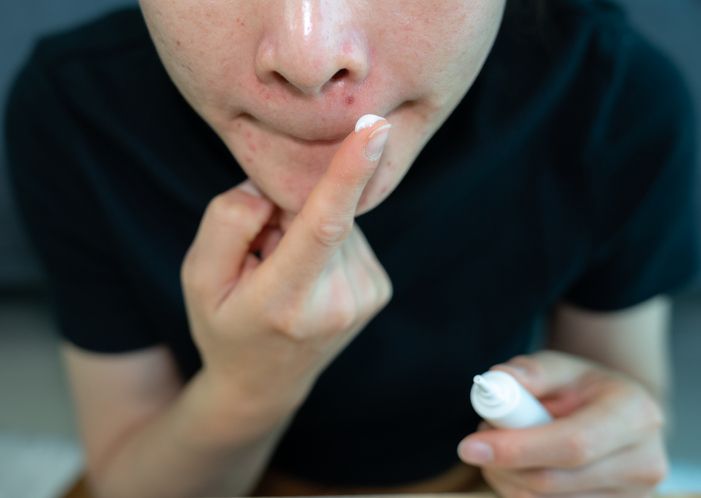
Acne scars often linger, a reminder of battles fought with pesky pimples. These scars can come in various forms, from dark spots and uneven skin tone to raised or hypertrophic scars.
While sensitive skin itself doesn't necessarily lead to worse acne scars, individuals with sensitive skin may be more prone to inflammation and irritation. Acne scars are often the result of inflammatory acne lesions, and if the skin is more sensitive, it may react more strongly to acne breakouts, potentially leading to increased inflammation.
Also, just like people with normal skin, people with sensitive skin can develop various types of acne scars, just like those with other skin types. The most common types of acne scars include:
1. Ice Pick Scars
These are deep, narrow scars that extend into the dermis. They resemble small, round or oval holes in the skin, similar to the marks left by an ice pick.
2. Boxcar Scars
Boxcar scars are broader depressions with sharp edges that resemble craters. They can be shallow or deep and are typically wider than ice pick scars.
3. Rolling Scars
Rolling scars create a wavy texture on the skin, often due to fibrous bands of tissue pulling the epidermis downward. They may give the skin a rolling or undulating appearance.
4. Hypertrophic Scars
Unlike most acne scars that result in depressions in the skin, hypertrophic scars are raised and may appear as thick, raised bumps. They develop when the body produces too much collagen during the healing process.
5. Keloid Scars
Keloids are similar to hypertrophic scars but extend beyond the original wound or acne lesion. They can be itchy, painful, and may continue to grow over time.
6. Post-inflammatory Hyperpigmentation (PIH)
While not a true scar, PIH is a common consequence of acne, especially in individuals with sensitive skin. It appears as dark spots or discoloration at the site of previous acne lesions.
Sensitive skin may react more strongly to inflammation, potentially increasing the risk of scarring. It's crucial to manage acne carefully to minimise the development of scars. Additionally, individuals with sensitive skin should be cautious with skincare products and treatments to avoid further irritation or complications.
2
What Happens if I Refuse to Use Acne Scar Cream or Get Any Other Acne Scar Treatments?
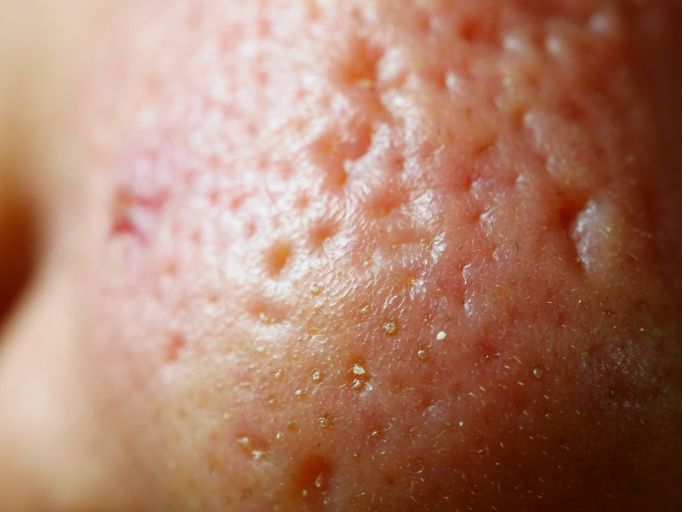
Leaving acne scars untreated may not necessarily lead to serious health issues, but it can affect the appearance and texture of the skin. The long-term consequences of untreated acne scars can include:
Persistent Discoloration
Acne scars, especially post-inflammatory hyperpigmentation (PIH), can cause persistent dark spots or redness. Over time, without intervention, these marks may take longer to fade.
Worsening of Scars
In some cases, untreated scars may become more pronounced over time. This is particularly true if the skin is prone to inflammation, and ongoing acne breakouts can exacerbate existing scars.
Impact on Self-Esteem
Acne scars can have a significant impact on an individual's self-esteem and confidence. Some people may feel self-conscious about their appearance, leading to emotional and psychological effects.
Changes in Skin Texture
Depending on the type of acne scars, such as ice pick or boxcar scars, you may eventually have uneven skin texture. This can affect the smoothness of the skin and make it more challenging to achieve a clear complexion.
This is bad especially when you have sensitive skin. Leaving acne scars untreated may pose additional challenges:
Increased Sensitivity
Sensitive skin is more prone to inflammation and irritation. Untreated scars may continue to cause sensitivity, redness, or discomfort.
Risk of Further Irritation
Without proper care, sensitive skin can be more susceptible to irritation and may react negatively to environmental factors or harsh skincare products. This can complicate the healing process and worsen the appearance of scars.
Potential for Future Breakouts
If acne scars are left untreated, there is a risk of ongoing acne breakouts. New breakouts can further contribute to scarring, creating a cycle of skin issues.
It's essential for individuals with sensitive skin to take a proactive approach to skincare, including the treatment of acne scars.
- What Are Comedones? Tracing Their Life Cycle and Impact on Skin
- 3 Major Types of Acne Scars and Their Causes — Plus Common Acne Scar Filling Treatment Options
- 4 Major Skin-Enhancing Benefits of Microneedle Mask + High Value-for-Money Product Recommendations
- Acne Scarring Fillers: Why & How It Can Fix Your Scar Problems
3
Sensitive Skin With Acid: Is This A Good Combination? Common Ingredients in Acne Scar Cream
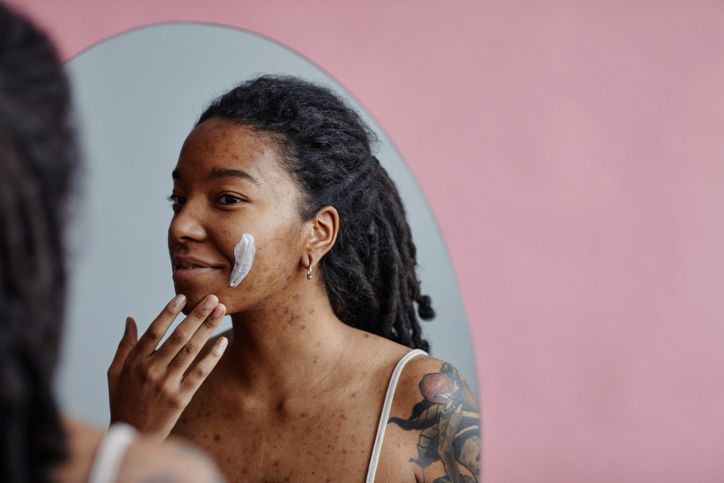
There are various types of over-the-counter and prescription creams and treatments designed to address different types of acne scars. While everyone's skin is different, and sensitivities can vary, some acids are generally considered more likely to cause irritation in individuals with sensitive skin. It's important to note that individual reactions can vary, and what works for one person may not work for another. Here are a few kinds of ingredient like acid and more that are potentially suitable for sensitive skin with the correct concentration:
1. Salicylic Acid
A superhero for treating acne scars, salicylic acid dives deep into your pores, clearing out dead skin cells and promoting a smoother complexion. It's particularly effective for active acne, making it a versatile ingredient for those dealing with both scars and ongoing breakouts.
2. Glycolic Acid
This gentle exfoliator aids in skin cell turnover, helping to fade dark marks and improve skin texture. It's a go-to for achieving that coveted glow while addressing acne scars.
3. Vitamin C
Known for its brightening properties, vitamin C is a powerhouse in the quest for the best acne scar treatment. It not only helps even out skin tone but also stimulates collagen production, promoting skin elasticity.
4. Lactic Acid
Ideal for those with sensitive skin, lactic acid provides a gentle exfoliation, aiding in the reduction of dark spots and acne scars. It's a fantastic option for maintaining a delicate balance while achieving visible results.
5. Vitamin E
Renowned for its skin-nourishing properties, vitamin E works wonders in combination with other ingredients to soothe and repair damaged skin. It's a crucial component in the quest to fade scars and improve overall skin health.
6. Retinoids
These are derivatives of vitamin A that encourage cell turnover and stimulate collagen production. Tretinoin is a prescription-strength retinoid often used to treat acne scars.
7. Vitamin C
Ascorbic acid (vitamin C) is an antioxidant that can help brighten the skin and promote collagen production, potentially improving the appearance of acne scars.
8. Hydroquinone
This is a skin-lightening agent that can help reduce the appearance of dark spots or hyperpigmentation associated with acne scars. It's available both over-the-counter and in prescription strength.
9. Niacinamide (Vitamin B3)
Niacinamide has anti-inflammatory properties and can help improve the overall texture and tone of the skin.
4
Tips to Use Acne Scar Cream with Acids on Skin

Yes, individuals with sensitive skin can use acids to help address acne scars, but it's crucial to proceed with caution and choose the right acids at appropriate concentrations. Not all acids are suitable for sensitive skin, and using them incorrectly can lead to irritation or worsen the sensitivity. Here are some considerations:
Start with Low Concentrations
If you're new to acids, start with lower concentrations. For example, products containing alpha hydroxy acids (AHAs) like glycolic acid or beta hydroxy acids (BHAs) like salicylic acid in lower concentrations can be less irritating for sensitive skin.
Patch Test
Always perform a patch test before applying any acid to your face. Apply a small amount of the product to a discrete area, like behind the ear or on the inner wrist, and monitor for any adverse reactions.
Choose the Right Acid
Different acids have different properties. AHAs, like glycolic acid, are generally good for surface-level exfoliation, while BHAs, like salicylic acid, can penetrate oil and are often recommended for acne-prone skin.
Frequency Matters
Start with a lower frequency of acid use, such as once or twice a week, and gradually increase if your skin tolerates it well. Overuse of acids can lead to irritation and compromise the skin barrier.
Moisturize and Protect
Always follow acid treatments with a good moisturiser to hydrate the skin and support its barrier function. Additionally, use a broad-spectrum sunscreen during the day to protect your skin, as acids can increase sensitivity to the sun.
Remember, the choice of acid and its concentration should be tailored to your skin's specific needs and tolerance. Below is a detailed guide for you to refer to, so you can incorporate it into your daily routine.

免費體驗
Acne Scarring Treatment
1 Minute Self-Registration
Date should not be before minimal date
5
How to Use Acne Scar Cream Correctly? Consistency is Key
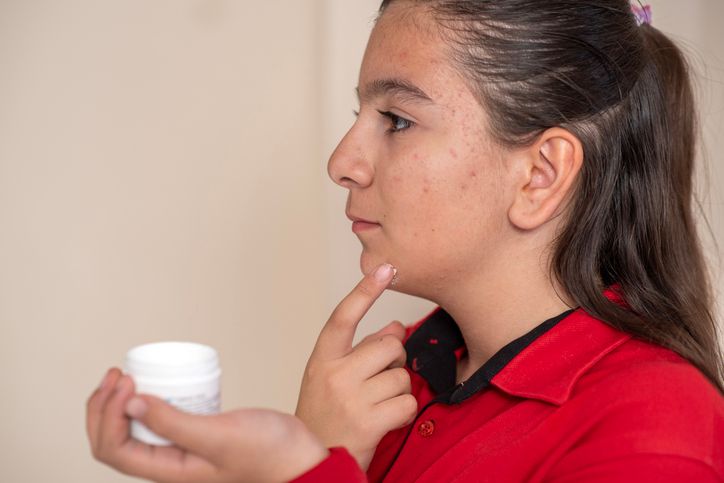
When it comes to addressing acne scars, the phrase "consistency is key" holds true. Achieving optimal results with acne scar creams requires a dedicated and regular skincare routine. Patience is crucial, as visible improvements may take time to manifest. Here's a breakdown of how to incorporate these creams into your daily skincare routine:
1. Cleanse
Start your routine with a gentle cleanser suitable for your skin type. Cleansing helps remove dirt, oil, and any residual product from the skin.
2. Treat
Apply your chosen acne scar cream or treatment after cleansing. Depending on the active ingredients, this could include products containing retinoids, alpha hydroxy acids (AHAs), beta hydroxy acids (BHAs), or other targeted scar-fading ingredients.
3. Moisturize
Follow up with a hydrating and nourishing moisturiser. This step is crucial, especially when using treatments that may cause dryness or irritation. Look for a moisturiser that suits your skin type.
4. Sun Protection
Apply a broad-spectrum sunscreen with at least SPF 30 every morning, even on cloudy days. Sun protection is essential because UV rays can worsen the appearance of scars and hinder the healing process.
Sample Routine
Morning: 1. Cleanse your face with a gentle cleanser. 2. Apply a vitamin C serum or cream to target dark spots and promote collagen production. 3. Follow up with a moisturiser suitable for your skin type. 4. Finish with a broad-spectrum sunscreen with at least SPF 30.
Evening: 1. Cleanse your face to remove the day's impurities. 2. Apply an acne scar cream containing retinoids, AHAs, or BHAs, depending on your skin's tolerance. 3. Moisturize to keep your skin hydrated and support the healing process.
By following this routine consistently and being patient, you can enhance the effectiveness of acne scar creams and work towards achieving a radiant, scar-free complexion over time.
6
Complement Your Acne Scar Fixing Journey with Professional Treatments!

Embarking on a journey to address acne scars often involves a combination of at-home skincare and professional treatments. Here's an explanation on how these treatments can complement your efforts in getting rid of acne scars:
1. Chemical Peels
A chemical peel is a dermatological procedure where a chemical solution is applied to the skin, causing it to exfoliate and eventually peel off. This process removes the outer layers of damaged skin, revealing smoother, regenerated skin.
Chemical peels with stronger acids, such as glycolic acid or salicylic acid, can penetrate deeper into the skin, promoting collagen production and improving the overall texture. They help fade hyperpigmentation, reduce the appearance of scars, and enhance skin renewal.
The intensity of the peel can be adjusted based on the specific needs of the patient, making it a customizable treatment option. Downtime and potential side effects depend on the depth of the peel.
2. Microneedling
Microneedling, also known as collagen induction therapy, involves the use of a device with fine needles that create microscopic channels in the skin. This process stimulates the natural healing response, leading to increased collagen production and skin rejuvenation.
By creating controlled micro-injuries, microneedling encourages the formation of new collagen and elastin, which can help improve the appearance of scars. It also enhances the absorption of topical products, maximising their effectiveness.
Microneedling is generally well-tolerated, and the downtime is typically minimal. Multiple sessions may be needed for optimal results.
3. Laser Therapy
Laser therapy involves the use of focused laser beams to target specific skin concerns. Different types of lasers can address various issues, such as pigmentation, redness, and collagen stimulation.
Laser treatment such as Acne Scarring Treatment can target pigmentation associated with acne scars and stimulate collagen production. This helps in reducing the appearance of scars, improving skin texture, and promoting an overall rejuvenated look.
There are various laser options, including ablative and non-ablative lasers. Ablative lasers remove thin layers of skin, while non-ablative lasers heat the tissue without removing it. The choice depends on the type and severity of scars, as well as individual skin characteristics.
- Revealing Radiance: A Friendly Guide to Chemical Peel for Acne Scar
- What Your Skin Care Specialist Won't Tell You: What Are Pockmarks, How To Differentiate & Cure Them
- How Long Do Dark Acne Marks Take to Fade? A Guide to 5 Types of Acne Marks and Scars — Plus the Most Comprehensive Treatment Solutions
- Tighten Pores With Ease: 5 Mistakes That Could Be Holding You Back
7
Before You Go
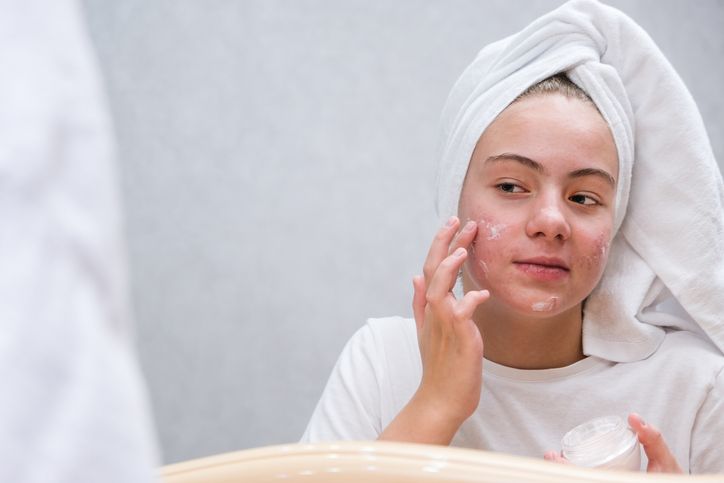
Banishing acne scars is a journey, and with the right acne scar cream, you're well on your way to achieving smoother, more even skin. As someone with sensitive skin, remember to choose products with key ingredients that has hydrating properties, and tailor your skincare routine to your unique needs. Embrace the process, and bid farewell to acne scar soon!

免費體驗
Acne Scarring Treatment
1 Minute Self-Registration
Date should not be before minimal date
FAQ

1. What are the best acne scar treatments for depressed acne scars?
Depressed acne scars, including boxcar and ice pick scars, often benefit from treatments that promote collagen production and skin renewal. Some of the best options include retinoids, chemical peels, and microneedling.
2. Can acne scar creams effectively fade scars on sensitive skin types?
Yes, certain acne scar creams are formulated to be gentle on sensitive skin types. Look for creams containing soothing ingredients like niacinamide and avoiding harsh chemicals. Always perform a patch test before regular use.
3. How long does it typically take for acne scar creams to start fading scars?
The timeline for seeing results with acne scar creams can vary. Generally, visible improvements may be noticed within a few weeks to months, depending on factors like the severity of scars and the specific ingredients in the cream.
4. Are there specific creams recommended for scar tissue associated with acne?
Yes, scar tissue resulting from acne can benefit from creams containing ingredients like silicone, which helps improve the texture of scars. Additionally, creams with retinoids and alpha hydroxy acids may aid in reducing scar appearance.
5. What is the most effective acne scar cream for depressed acne scars?
The choice of the most effective cream depends on the type and severity of depressed acne scars. Creams with a combination of retinoids, vitamin C, and alpha hydroxy acids are often recommended for mild to moderate scars.








